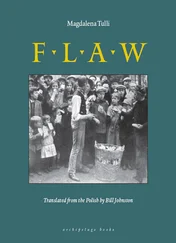“Is anyone even watching over it all?” he would ask, his eyes straying over the stucco garlands on the ceiling.
“Mais oui!” Madame would reply, and perch on his lap like a pink butterfly. “The two of you are.”
For out of his own pocket Slotzki paid half the rent, which rose from month to month, spinning in ever more beautiful circles. The other half was paid by Chmura.
BEFORE DAWN FELEK, SPRAWLED ON THE PLUSH SOFA WITH eyes shut and mouth open, his shallow breath whistling, would turn a handsome profit speculating in shares in South African diamond mines, only to lose it all later in the shipwreck of a freighter, having invested in the shipping of expensive Indian saffron — his British insurance company found a way not to have to pay up, filling him with an infinite bitterness that was yellow as the saffron itself.
In the meantime Slotzki, his head tipped back on the headrest of the armchair, was examining his washbasins, smooth and white, stacked all the way up to the ceilings of his warehouses. Dazzlingly pure, if one ignored the rusty stains that appeared on them out of nowhere. Where did those stains come from? he would ask. Well, if stains have come out, it must mean they were already there before, the foremen would stammer in explanation. Get rid of them, Slotzki would shout, scrub them till you’re blue in the face, I don’t want to see the slightest trace of them. And so the workers cleaned the washbasins, scrubbing with powder and lye, till they scraped off the enamel and the surfaces became coated with a uniform dirty grayness that in places looked as if it were bleeding.
Chmura and Slotzki would rise in the morning all out of shape, their collars digging into their necks, and thrust their swollen feet into their shoes. Hurrying each to his own affairs, without sitting down they would drink a mug of sour milk that the old serving woman had brought them out of pity.
“Spending the night on the sofas! Right where they fell asleep! It’s not like we’re short of beds here!” she would mumble to herself as she took the empty mugs back into the kitchen. “Poor guys, no one here looks after them.”
Madame would not allow anyone to wake her before eleven. A bed jacket thrown around her shoulders, a glass of brandy in her hand — for the toothache that always troubled her in the morning — she would go and count the sheets just brought back from the press.
“Parbleu!” she would exclaim. “The hems are coming unstitched again. Do something about it. Get a seamstress.”
And she would set the gilt-rimmed glass down by the shank of beef for making broth and the large basket of soup vegetables, as the butcher’s boy was already wringing his cap in his hands, smiling awkwardly on the doorstep. Madame quickly checked the bill and gave him his money, then she paid the laundrywoman and the coal merchant and, recalling a thought from the day before, she sent to the soap shop for floor polish or turpentine.
“Those women alone never want for cash,” the clerk would whisper to the next customer with a knowing look as he leaned over the soapflake-strewn counter.
“THOSE WOMEN ALONE HAVE NO WORRIES IN LIFE,” SAID Stefania Chmura as she paced her bedroom from the bed to the wardrobe and back again. She ran a soup kitchen for war invalids and she always had to worry about where she would get the ingredients for the next day’s meal. Every morning the cooks had to boil huge cauldrons of water; day after day they had to chop up bones, peel potatoes, and stoke the stove all morning. At lunchtime the former soldiers would crowd outside the closed gateway till they were let in. A quarter of an hour later they would reemerge onto the street, smoking cigarettes and complaining — the ingrates — about the awful food. They would fall sick and die to spite Stefania. Their wives, on the other hand, were resolved to put up with anything. But they worked themselves to death over their tubs of laundry. Their daughters went into service and were not a problem. Stefania established an orphanage for the boys, to stop them from wandering the streets unsupervised.
“They’re not boys, they’re wild animals,” she would say of them bitterly. They smeared ink on the walls and broke the chairs. They ripped their shirts and pants in endless attempts to escape from the grim barracks-like building on Guards Street. Philanthropy came at a cost. Stefania was in constant need of cash. Every time Felek left his wife’s bedroom he placed a wad of banknotes on the mahogany dressing table.
As Madame’s girls stood at the mirror putting on their crimson lipstick they would gossip about Slotzki and Chmura. They speculated about their benefactors’ intentions, but it was impossible to guess what these two men were after. The living fire that one of them had survived had forever marked his body with its hideous stamp and had reduced his desire to ashes. That one wanted nothing more than a kiss in greeting from Madame. While the other’s only wish was for house slippers to be always waiting for him by the sofa in the pink parlor; for everything else he preferred to pay his wife, Stefania.
“The hussy,” the girls declared indignantly. “And of top of everything she’s older than him!”
Stefania would reach for Felek’s money the moment the door closed behind him; she would study both sides of each banknote closely. There were more and more counterfeit bills of various denominations in circulation. They were used to pay for coal, for bread, for the rent. The longer they were passed around the paler they became, gradually coming to resemble scraps of ordinary wrapping paper on which nothing at all could be made out. In the early morning such a slip of paper had gone from hand to hand like a hot brick, then by afternoon no one wanted it anymore. But it always managed to wind up in the pocket of some overworked washerwoman. She would try to use it to pay for a basket of coal or a loaf of bread, as she wandered among the coal yards and from one bakery to another. The storekeepers didn’t even need to look at the watermark, the loss of value had happened elusively but suddenly. Those kinds of notes were spotted from afar.
“You can still use them to light the fire,” the impudent shop boy would call out as the woman was on her way out.
In the end it came to it that nothing but counterfeit money was found in the town, and it all flowed into Felek’s coffers. In Stitchings at that time even the bank used a double accounting system and dealt in suspiciously pale banknotes. In the hotel restaurant Chmura would toss them down for the waiters without even counting them, in the street he would do the same with the organ-grinders. Sooner or later they had to come back to him, it couldn’t have been any other way. His wallet weighed like a stone in his pocket. Huge bundles of false bills filled his safes. He would stick wrappers around them and stash them wherever he could, stacking them in drawers, and later also under beds, in armchairs, on side tables.
At this point the circus wagon returned to town and once again the great white tent went up on Guards Street. A solitary man, aged and wrinkled, had to hire a joiner to help put up the apparatus. As it transpired from posters stuck up on advertising pillars, he intended to ride a bicycle along a rope stretched high up between the poles of the big top. Crowds hungry for spectacle thronged at the barrier; the more impossible such a feat seemed to them, the more they wished to see it.
“He already did this trick in Berlin, in Warsaw, in Vienna,” word went around. At the box office people snatched tickets from one another’s hands. Felek sent a dorozhka for the man so he could have him reveal the secret of the trick with the banknotes. But the man just waved his hand dismissively and the dorozhka came back empty.
Читать дальше












